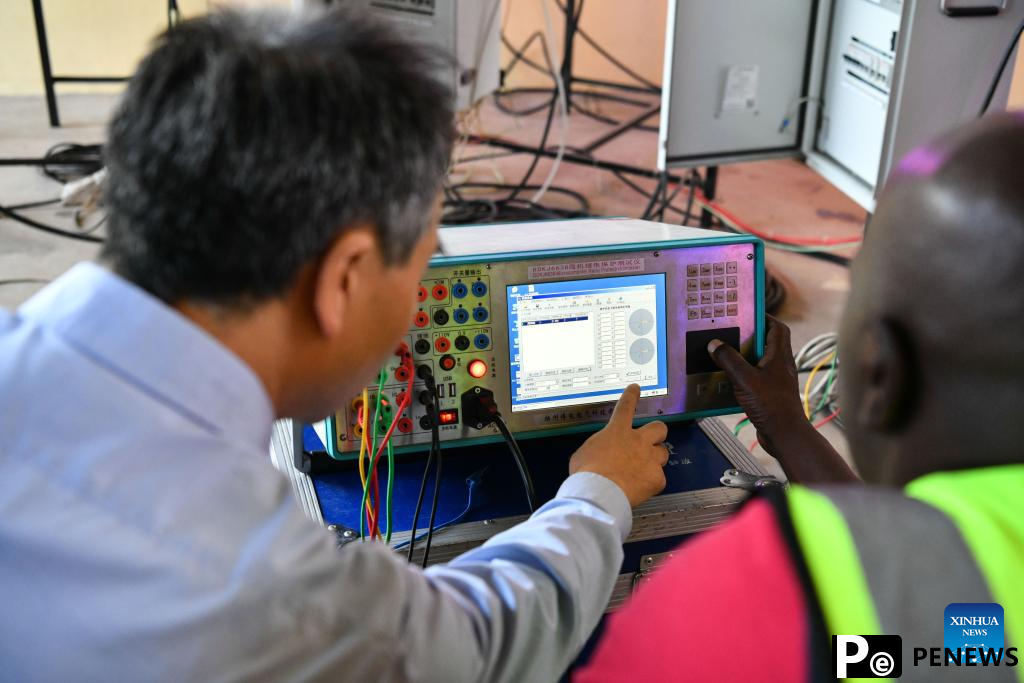Home>>
Chinese companies playing key global roleBy Zhong Nan (China Daily) 09:11, December 19, 2023

A virtual reality headset and handsets are experienced by a visitor to the first China International Supply Chain Expo. [WANG JING/CHINA DAILY]
Combined actions ensure smooth operation of industrial and supply chains
Despite Samsung Electronics Co discontinuing smartphone production in China several years ago, its assembly plants in Bac Ninh Province, Vietnam, receive shipments of phone accessories from China each day at 4 pm.
These electronic parts, packed and shipped from suppliers in the Pearl River Delta region a day earlier, reach Pingxiang land port in the Guangxi Zhuang autonomous region at midnight.
After completing Customs procedures at the Vietnamese border, they are classified, assigned and assembled at the South Korean company's workshops in Vietnam.
The smartphones, complete with various types of charging plugs, are exported to countries worldwide, including China, Saudi Arabia, France, the United States, Brazil and Kenya.
Amid diminishing global demand for goods and disruptions to global supply chains, such shipments illustrate the pivotal role played by Chinese companies in ensuring the smooth operation of industrial and supply chains across the world.
Fueled by the nation's comprehensive industrial chain and international production capacity cooperation, Chinese companies export a substantial quantity of intermediate goods each year.
Huang Lingli, deputy director of the General Administration of Customs' commodity inspection department, said these goods include industrial parts, chemicals, yarns, cables and electronic components. They are sent to a diverse range of economies that include developed and developing nations such as Vietnam, India, South Korea, Mexico and Hungary.
Traditional export categories, including daily necessities and footwear, are giving way to high-tech innovation in the new energy and high-end manufacturing sectors, Huang said. As a result, China's foreign trade is shifting toward sustainability, and this trend has seen many domestic companies expand their global presence.
One of them is Contemporary Amperex Technology Co, which manufactures electric vehicle batteries in Ningde, Fujian province. In addition to announcing that it will build its second factory in Hungary in September, the company said last month it would accelerate its overseas expansion by building a fourth plant in Europe.
As Western countries have elevated global supply chain competition from the microbusiness level to the macro level of national strategy, China has consistently refined its supply chain strategy to remain competitive. This trend is highlighted in a supply chain-themed report published by the China Council for the Promotion of International Trade at the first China International Supply Chain Expo, or CISCE, which was held in Beijing.
The global gathering, staged from Nov 28 to Dec 2, attracted a total of 515 domestic and global companies, as well as international organizations. The council, which organized the event, said it was attended by 150,000 visitors, including more than 80,000 buyers and professionals.
Chen Xuedong, an academician at the Chinese Academy of Engineering, said China's endorsement of global supply chain cooperation will accelerate the digital and green transformation for domestic and international businesses.
The nation's efforts can catalyze innovation and promote collaboration among numerous stakeholders, Chen added.

A miniature robot is displayed at the expo. [WANG JING/CHINA DAILY]
Central focus
Long Guoqiang, vice-president of the State Council's Development Research Center, said, "The need to enhance the operations of global supply chains has become a central focus for strategic initiatives pursued by businesses and governments across the world."
With widespread emphasis placed on strengthening supply chain resilience in various industries and economies, there is an apparent lack of coordinated efforts to ensure that restructuring initiatives yield a truly robust, resilient and efficient global supply chain network, Long said.
As the world economy is facing the headwinds of deglobalization and the challenge of supply chain restructuring, China has taken measures to remove all restrictive measures on foreign investment in the manufacturing sector. It is using international transportation channels such as the New International Land-Sea Trade Corridor and China-Europe freight train services, as well as hosting the first CISCE, to encourage multinationals to invest in its market.
Ministry of Industry and Information Technology data show the added value of China's manufacturing sector accounted for nearly 30 percent of the global total last year, ranking first in the world for 13 consecutive years.












